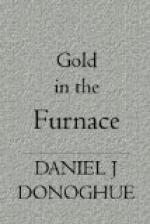In his pocket he had cautiously retained a little money—seven and one-half dollars, to be accurate. He returned to Beth, informed her of all he had discovered concerning her brother, took herself and Elsa to dine in the camp’s one presentable restaurant, paid nearly seven dollars for the meal, and gave what remained to the waiter.
Then Beth, who had never in her life been so utterly exhausted, resigned herself to Elsa’s care, bade Van good-night, and left him standing in the rain before the door, gallant, and smiling to the end.
CHAPTER IX
PROGRESS AND SALT
Goldite, by the light of day, presented a wonderful spectacle. It was a mining camp positively crystallizing into being before the very eyes of all beholders. It was nearly all tents and canvas structures—a heterogeneous mixture of incompleteness and modernity to which the telegraph wires had already been strung from the outside world. It had no fair supply of water, but it did have a newspaper, issued once a week.
A dozen new buildings, flimsy, cheap affairs, were growing like toadstools, day and night. Several brick buildings, and shacks of mud, were rising side by side. Everywhere the scene was one of crowds, activity, and hurry. Thousands of men were in the one straight street, a roughly dressed, excited throng, gold-bitten, eager, and open-handed. Hundreds of mules and horses, a few bewildered cows, herds of great wagons, buggies, heaps of household goods, and trunks, with fortifications of baled hay and grain, were crowded into two great corrals, where dusty teamsters hastened hotly about, amidst heaps of dusty harness, sacks of precious ore and the feed troughs for the beasts.
Beth had slept profoundly, despite the all-night plague of noises, penetrating vividly through the shell-like walls of the house. She was out with Elsa at an early hour, amazingly refreshed and absorbingly interested in all she heard and saw. The sky was clear, but a chill wind blew down from the mountains, flapping canvas walls in all directions.
The building wherein the women had rested was a wooden lodging house, set barely back from the one business street of the camp. Next door was a small, squat domicile constructed of bottles and mud. The bottles were laid in the “mortar” with their ends protruding. Near by, at the rear of a prosperous saloon, was a pyramid of empty bottles, fully ten feet high—enough to build a little church.
Drawn onward by the novelty of all the scene, Beth crossed the main street—already teeming with horses, wagons, and men—and proceeded over towards a barren hill, followed demurely by her maid. The hill was like a torn-up battlefield, trenched, and piled with earthworks of defense, for man the impetuous had already flung up great gray dumps of rock, broken and wrenched from the bulk of the slope, where he quested for gleaming yellow metal. He had ripped out the adamant—the matrix of the gold—for as far as Beth could see. Like ant-heaps of tremendous dimensions stood these monuments of toil—rock-writings, telling of the heat and desire, the madness of man to be rich.




